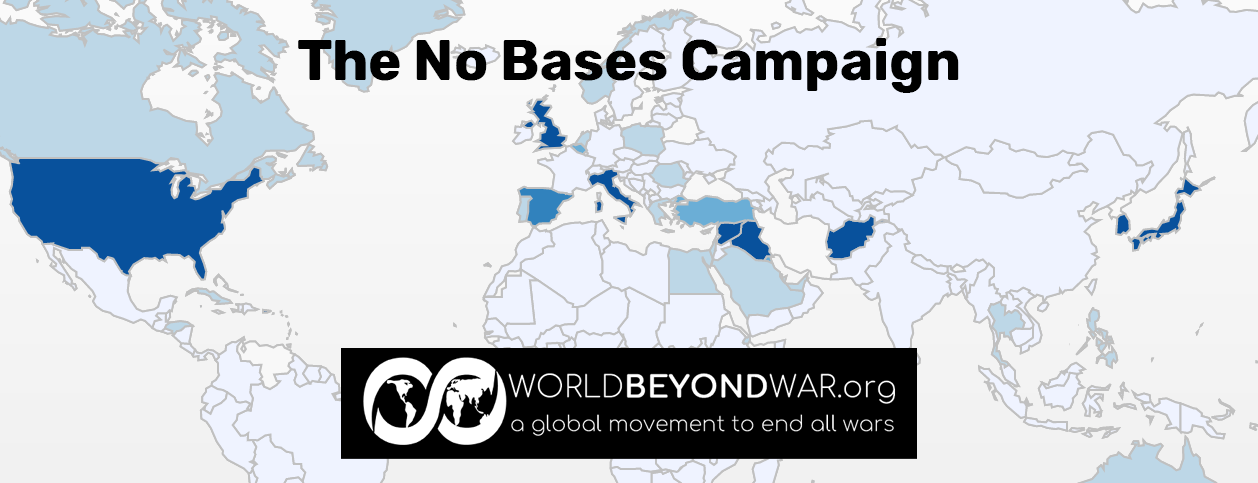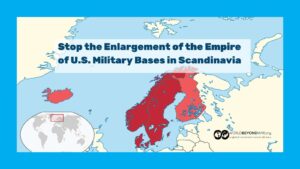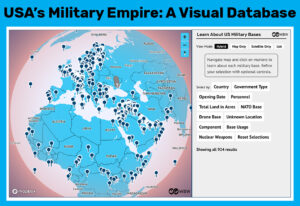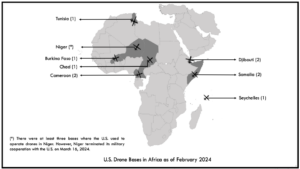
See our new tool for viewing U.S. bases around the world!
The closing of U.S. bases and the removal of U.S. military personnel from foreign countries are critical to the elimination of war. This campaign is a major focus for World BEYOND War.
Despite the withdrawal of U.S. military bases and troops from Afghanistan, the United States continues to maintain hundreds of military bases abroad in 80 foreign countries and colonies (territories). These bases are costly in a number of ways: financially, politically, socially, and environmentally. U.S. bases in foreign lands often raise geopolitical tensions, support undemocratic regimes, and serve as a recruiting tool for militant groups opposed to the U.S. presence and the governments its presence bolsters. In other cases, foreign bases are being used and have made it easier for the United States to launch and execute disastrous wars, including those in Afghanistan, Iraq, Yemen, Somalia, and Libya. Across the political spectrum and even within the U.S. military there is growing recognition that many overseas bases should have been closed decades ago, but bureaucratic inertia and misguided political interests have kept them open.
Amid an ongoing “Global Posture Review,” the Biden administration has a historic opportunity to close hundreds of unnecessary military bases abroad and improve national and international security in the process.
The Pentagon, since Fiscal Year 2018, has failed to publish its previously annual list of U.S. bases abroad. As far as we know, this brief presents the fullest public accounting of U.S. bases and military outposts worldwide. The lists and map included in this report illustrate the many problems associated with these overseas bases, offering a tool that can help policymakers plan urgently needed base closures.
Read Drawdown: Improving U.S. and Global Security Through Military Base Closures Abroad.
Latest Articles:
Reasons to Close the Bases:
- They heighten tension. The presence of almost 200,000 U.S. troops, massive arsenals, and thousands of aircraft, tanks, and ships in every corner of the Earth present a very real threat to surrounding nations. Their presence is a permanent reminder of the military capacity of the U.S. and are a provocation to other nations. Even worse for heightened tensions, the resources housed on these bases are used for military “exercises,” which are essentially, practice for war.
- They facilitate war. The prepositioning of weapons, troops, communications equipment, aircraft, fuel, etc. make the logistics for U.S. aggression quicker and more efficient. Because the U.S. is continually creating plans for military actions around the world, and because the U.S. military always has some troops “on the ready,” the initiation of combat operations is very simple.
- They encourage militarism. Rather than deterring potential adversaries, U.S. bases antagonize other countries into greater military spending and aggression. Russia, for example, justifies its interventions in Georgia and Ukraine by pointing to encroaching U.S. bases in Eastern Europe. China feels encircled by the more than 250 U.S. bases in the region, leading to a more assertive policy in the South China Sea.
- They provoke terrorism. In the Middle East in particular, U.S. bases and troops have provoked terrorist threats, radicalization, and anti-American propaganda. Bases near Muslim holy sites in Saudi Arabia were a major recruiting tool for al-Qaeda.
- They endanger host countries. Countries which have U.S. military assets stationed on them become targets for attack themselves in response to any U.S. military aggression.
- They house nuclear weapons. Effective 22 January 2020, the Treaty on the Prohibition of Nuclear Weapons (TPNW) will take effect. Nuclear weapons belonging to the U.S. are positioned in five European countries which do not have nuclear weapons themselves: Belgium, Germany, Italy, the Netherlands, and Turkey, plus one that does: the UK. The possibility of an accident, or becoming a target could be catastrophic.
- They support dictators and repressive, undemocratic regimes. Scores of U.S. bases are in more than 40 authoritarian and less-than-democratic countries, including Bahrain, Turkey, Thailand, and Niger. These bases are a sign of support for governments implicated in murder, torture, suppressing democratic rights, oppressing women and minorities, and other human rights abuses. Far from spreading democracy, bases abroad often block the spread of democracy.
- They cause irreparable environmental damage. Most host country agreements were made in the years before many environmental regulations were in place, and even now, the standards and laws that have been created for the U.S. do not apply to U.S. foreign military bases. There are no enforcement mechanisms for host countries to apply to ensure adherence to local environmental regulations either and may not even be permitted to do inspections due to Status of Forces Agreements (SOFA) between the countries. Moreover, when a base is returned to the host country there are no requirements for the U.S. to clean up the damage it has caused, or even disclose the presence of certain toxins like Agent Orange or depleted uranium. The cost to clean up fuel, firefighting foam, etc., can cost billions. Depending on the SOFA, the U.S. may not have to fund any of the clean-up at all. The construction of the bases has caused permanent ecological damage as well. The construction of a new facility which is currently being constructed in Henoko, Okinawa is destroying soft coral reefs and the environment for endangered species. Jeju Island, South Korea, an area designated as an “Absolute Conservation Area” and a UNESCO Biosphere Conservation, and despite strong opposition by inhabitants of Jeju Island, a deep water port is being constructed for use by the U.S. which has caused irreparable damage.
- They cause pollution.The exhaust of U.S. planes and vehicles cause significant degradation of air quality. Toxic chemicals from the bases enters the local water sources, and jets create enormous noise pollution. The U.S. military is the single biggest consumer of fossil fuels and producer of greenhouse gas emissions in the world, yet this is rarely acknowledged during discussion of climate change. In fact, the United States insisted on an exemption for reporting military emissions in the 1997 Kyoto Protocol.
- They cost an exorbitant amount of money. Estimates of the yearly cost of U.S. foreign military bases range from $100 – 250 billion. According to the United Nations, world starvation could be ended for the cost of only $30 billion per year; just imagine what could be done with an additional $70 billion.
- They deny land to indigenous populations. From Panama to Guam to Puerto Rico to Okinawa to dozens of other locations across the world, the military has taken valuable land from local populations, often pushing out indigenous people in the process, without their consent and without reparations. For example, between 1967 and 1973, the entire population of the Chagos Islands – about 1500 people, was forcibly removed from the island of Diego Garcia by the UK so that it could be leased to the U.S. for an airbase. The Chagossian people were taken off their island by force and transported in conditions compared to those of slave ships. They were not allowed to take anything with them and their animals were killed before their eyes. The Chagossians have petitioned the British government many times for return of their home, and their situation has been addressed by the UN. Despite an overwhelming vote of the UN General Assembly, and an advisory opinion by the International Court of Justice in the Hague that the island should be returned to the Chagossians, the UK has refused and the US continues operations from Diego Garcia today.
- They cause economic problems for “host” countries. The rise in property taxes and inflation in areas surround U.S. bases has been known to push locals out of their homes to seek more affordable areas. Many of the communities hosting bases overseas never see the economic windfalls that U.S. and local leaders regularly promise. Some areas, especially in poor rural communities, have seen short-term economic booms touched off by base construction. In the long-term, however, most bases rarely create sustainable, healthy local economies. Compared with other forms of economic activity, they represent unproductive uses of land, employ relatively few people for the expanses occupied, and contribute little to local economic growth. Research has consistently shown that when bases finally close, the economic impact is generally limited and in some cases actually positive — that is, local communities can end up better off when they trade bases for housing, schools, shopping complexes, and other forms of economic development.
- They station American troops who commit crimes. Throughout decades of a permanent U.S. military presence abroad, the military and its personnel have committed many atrocities. Overwhelmingly, the crimes go unnoticed and the perpetrators go unpunished. Rather than a collection of isolated incidents, they comprise a pattern of human rights abuses and, in some cases, war crimes. The lack of respect for the lives and bodies of indigenous people is another product of unequal power relationships between U.S. military and the people whose land they occupy. American troops abroad are often afforded impunity to injure and kill those understood to be inferior to them. These crimes carried out directly by U.S. personnel are suffered by powerless populations who have no recourse to obtain justice. Even their narratives are covered up and ignored. American troops commit crimes out of uniform as well. There is a long history on the Japanese island of Okinawa of the local population suffering violent crime at the hands of the American military including kidnapping, rape, and murders of women and girls. Prostitution is often pervasive around U.S. bases.
The Bottom Line
The closing of U.S. foreign military bases would have a significant effect on global perceptions, and represent a massive shift in foreign relations. With each base closure, the U.S. would become less of a threat. Relations with host countries would be improved as the base real estate and facilities are rightfully returned to local government. Because the United States is far and away the most powerful and aggressive military in the world, the closing of foreign bases would represent an easing of tensions for everyone. If the U.S. makes such a gesture, it may induce other countries to address their own foreign and military policies. The closing of U.S. bases and the removal of U.S. military personnel are critical to the elimination of war. There is a good reason that the rest of the world considers the United States as the biggest threat to peace. To get involved, scroll down and contact us, or sign the Declaration of Peace here and check “I want to work on closing bases” to get involved. To learn more, check out these resources:- Articles on this website about bases and closing them
- Mapping Where the Foreign Bases Are
- Drawdown: Improving U.S. and Global Security Through Military Base Closures Abroad
- Foreign Bases That Have Been Closed, and How
- Powerpoint on closing bases. World BEYOND War can present this workshop to groups, in-person or virtually. Click here to contact us to arrange an event with your group.
- A report on the social and environmental risks of U.S. bases in Australia, prepared by Friends of the Earth Australia and the Independent and Peaceful Australia Network.
- Bombs in Your Backyard: searchable database that allows people in the U.S. to find military installations near them and see the toxic impacts
- A Pentagon Report released in March, 2018 details widespread chemical poisoning of water supplies on military bases and in surrounding communities worldwide.
- World BEYOND War and allies met in Dublin, Ireland, in November 2018. Text and video of David Swanson’s remarks are here. Pat Elder presented here on the subject of the environmental damage of bases. Three complete videos of the three days of the conference are here. The conference program and schedule are here.
- United States of War by David Vine
- The Sun Never Sets: Confronting the Network of U.S. Foreign Military Bases by Joseph Gerson
- Base Nation: How U.S. Military Bases Abroad Harm America and the World by David Vine
- Island of Shame: The Secret History of the U.S. Military Base on Diego Garcia by David Vine
- The Bases of Empire: The Global Struggle against U.S. Military Posts by Catherine Lutz
- Homefront by Catherine Lutz
- How to Shut Down a Military Base.
- Highlights from Conference on No Foreign Bases, January, 2018, and David Swanson’s remarks, and full conference.
- Colonialism & Contamination: Mapping U.S. Military Injustices on the Chamorro People of Guam.
- No War 2017 Workshop on Closing Bases: Part 1, Part 2, Part 3.
- David Vine at No War 2016.
- Kozue Akibayashi at No War 2016.
- Il Comitato No Guerra No Nato alla Prima Conferenza Internazionale Contro le Basi Militari USA/NATO.
- U.S. Vets Expose Irish Govt Complicity In War Crimes.
- Standing Army.
- Conferenza Internazionale “Pathways to Peace”.
- Koza, Okinawa: Base Town Blues.
- Sea Still Shivering -The Big Problems Of Henoko New Military Base Construction.
- China Is Not Our Enemy with Rob Kajiwara on Okinawa.
- The Overseas Military Base Empire With Leah Bolger.
- Demilitarizing the Pacific: Ryukyu, Mariana, Hawaii | UN Human Rights Council 46th Session
- The US’ Overseas Military Base Strategy
- Why 90% Of Foreign Military Bases Are American
World BEYOND War Board President Leah Bolger is a retired U.S. Naval officer and was stationed in four foreign countries. She is available to present a one-hour webinar on U.S. bases and how to close them, upon request to your group or organization. Contact us below to schedule one.
Use these tags! #NoBases #NoWar #WorldBEYONDWar
Get involved in working on a campaign to close bases by contacting us:










